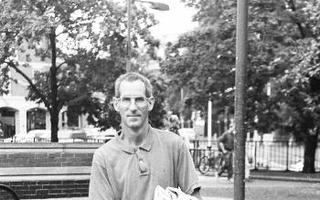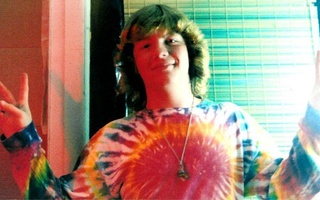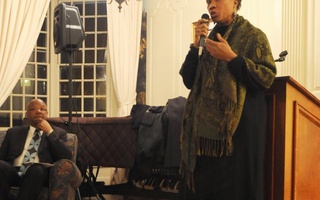They took good care of it and it became famous. On April 16, 1966, at 1:30 a.m. Leary was in bed. His son Jacky and a friend were in the room talking with him about a paper Jacky was writing. They heard noises in the hallway. Jacky opened the door, slammed it and said, "Wow, Dad, there's about fifty cops out there!" according to Leary. He jumped out of bed and was in the middle of the room when two sheriffs and two assistant district attorneys burst open the door and came in. Leary was wearing only pajama tops. Twenty-nine adults were present, all but three in bed. All the women were stripped and searched. Three people were arrested for possession of marijuana and Leary was arrested on a charge involving his being director of the house.
The group was constantly running into such difficulties, but Alpert personally stayed out of trouble and out of the limelight. He was way into drugs. He tried every chemical he was handed. He smoked pot constantly. He took over 300 LSD trips including a marathon in which he and a few friends closeted themselves in a bowling alley in the mansion and took 400 micrograms of acid every four hours for three weeks. The first shot put them into the ecstatic, pure, ego-free state of consciousness that washes all the blues away, but after that they descended into the intermediate state of hallucinatory drifting that people who have worked out a system for such phenomena (see The Tibetan Book of the Dead) called Second Bardo. "We never slept, we just sort of went into neutral," Alpert says. Every now and then they injected themselves with dimethyltriptamene to jack themselves back up to First Bardo, but they could not maintain it for long. At the end of the three weeks they came down in fine physical shape but disappointed that they were just as straight as ever once the drug wore off.
For that was Alpert's goal, to learn from his LSD trips how to maintain the same selfless intensity of life without chemical assistance. He had begun his experiments with drugs with the intent to explore the entire range of his experience in a deliberate, methodical way. After all, he was a psychologist, and a rationalistic one at that. He carefully prepared each session by deciding on a topic to consider and preparing a relevant setting. He might choose to trip on women and fill a room with pictures of lovers, his mother, his grandmother, movie stars, the Mona Lisa, little girls. He would write questions to ask himself on big pieces of cardboard and put them up on the wall. Most of his trips were directed in this way. His insights about himself--some good, some frightful -- accumulated. Each time he came down he was in a slightly different place, he was slightly more aware, slightly more knowledgeable. But gradually he came to realize that no matter how much he discovered about himself, that knowledge would not be fulfilling. He realized that self-exploration was futile; in simple terms, that it did not make him happy. The significance of an LSD trip was not the insights he retained after he came down but the fact that he came down at all. The best, highest parts of a trip were those times when he was selfless, out of his mind, thinking of nothing at all, in a pure mystical ecstasy, his energies freely merging with the energies of his environment. Thinking of himself brought him down, caused him to strain. And as the drug wore off he spiralled further and further down until he was caught in the same worries, emotions, frictions, conflicts, we all normally live with.
Well, Alpert realized, the thing to do is to stay high all the time. So he took the three-week trip hoping for a breakthrough, but ecstasy came only in spurts and he came down the same as ever. It was frightening. He began to think he would be caught in the same manicdepressive cycle for the rest of his life. At this point he had a nightmare trip in which he saw a tremendous red tidal wave of all the identities he had discovered and rejected come rolling back upon him, and he powerless to stop them from engulfing him. In that first trip years before in Leary's house in Newton he had almost miraculously thrown off all the constructs that defined him as a mortal being, and now here were they and the many more he had since isolated turning violently back on him.
The search for answers became an obsession. Alpert was tripping with the hippest of the hip--Alan Watts, author of books on Zen Buddhism and Eastern philosophy whom Alpert calls "an acute intellect but not a visionary," Scottish psychiatrist and author of The Politics of Experience, R. D. Laing, Ginsberg, mythical millionaire chemist Stanley Owsley, Leary. They went deeper and deeper into their studies of mystical writings and the literature of the East--Buddhism, yoga, Hindu, Zen, The Tibetan Book of the Dead, Laotzu's The Way of Life. They began to fear they were the wisest men in the world. They were afraid because they couldn't understand the powers they had unleashed, they knew there must be a way to control them, they knew they were still seeking, but they couldn't find the answers themselves and couldn't find anyone to tell them the answers. Leary and Ginsberg went to India to search out holy men who had conquered the secrets of consciousness, but when they came back Alpert looked into their eyes and realized they had discovered nothing.
All these years Leary and the others had been the philosophers, Alpert had been the administrator. He had made sure people were taken care of, watched over the kids, negotiated with the authorities, run the kitchen. He was also head of the underground FDA, making sure good quality drugs at fair prices were put on the market. He lectured all over the country, often tripping on acid or DMT as he spoke. After the lectures people would come up and tell him about their trips and he would carefully note what they said. He was a scientist gathering date. He wanted to map these unexplored realms of consciousness, he says. If you were put into a vast, strange forest and someone pointed down a path and said, "Down that path there is a snow apparition with fire coming out of its mouth," you would write it down. Gradually you would get a rough idea of your surroundings. Thus Alpert tried to systemize what was constant in the LSD experience. He found amazing correspondences between phenomena he and the others were incapable of explaining and phenomena in the writings of mystics.
The 1966 Stanley Owsley asked Alpert to come to New York to try out a new drug he was thinking of releasing on the market. The dosage hadn't yet been worked out and Owsley wanted Alpert opinion. Alpert intrepidly took what later would be called a triple dose. The drug was STP, the most powerful hallucinogenic ever synthesized. Alpert freaked out for four days. He felt like he was dead. He felt like he was in a soundproof box watching himself and his existence roll by outside like the tickertape on a newspaper building. On the third day of his trip he had a lecture scheduled at the University of Massachusetts. He practically had to be carried to the podium. He looked out at the faces and saw them as one face. He spoke for three hours, and when he finished, the hall was silent. Some people came up and stood around him, but they asked no questions. They were stunned. Many of the audience were physical education types who had come to see what this drug stuff was all about, Alpert says, and their reaction was anger. It was the only emotion they could summon. They would have killed him if they could, Alpert thought.
Shortly after he tried STP again, this time in the desert outside Taos, New Mexico. He prepared by fasting for four days and kept a tape recorder going as he tripped on the same dosage. The tapes from the first night were a monotonous rattling sound, the sound of his knees knocking together. When he tried to speak his chest and voice vibrated uncontrollably uhuh uh uh uhuhuhuh uhuh uh uh UH. He was glad he was alone in the desert because he had no control over his behavior. Such strong vibrations shook his bowels and groin he became so horny he would have raped anything he could lay his hands, on he says. He was astounded by the amount of energy he felt flowing through him in an uncontrollable torrent. The human body is. . . . what? We know nothing at all about the forces of our own bodies, he realized.
Alpert's STP experiences left him more perplexed and desperate for answers than ever. He knew well what he was rejecting, the abject fears of those committed to what they called "progress," "achievement," conformity, equilibrium, the naiveté of scientists who believed that the workings of the entire universe follow the laws of cause and effect, that we would know everything if we could just dissect existence into enough tiny pieces, that mankind would be saved if we could put it in a lead box. He knew also what he was seeking. He had glimpsed the capabilities of his mind and body. But he didn't know how to realize them.
ALPERT MET A LOT of unusual characters in his wanderings. One of the strangest was a head named David who had gone to college at 14, graduated from law school when he was 21, worked in Chinese economics at the U.N., made $30 million in business and retired at the age of 35. David was interested in exploring the external world, and he offered to put up the money if Alpert would accompany him to India. Alpert was at loose ends and faintly hopeful so he agreed to go. He packed a camera and slides and a large supply of LSD including his own custom-made 305-microgram tabs of White Lightning, the purest acid in the world. In India they got a Land Rover for a vehicle and a hip Hindi sculptor for a guide. They set off in a haze of hash, hunting for holy men. They wandered through the country staying at maharajah's palaces and eating at American restaurants, giving away hundreds of tabs of acid to putative mystics and taking wonderful slides.
The Indians' reactions to LSD were as varied as Westerners'--some found it pleasant, some disagreeable, some said it was better than meditation, some said it was worse. Alpert was thoroughly dissatisfied. They stopped at Buddhist monasteries and Hindu temples. They met the Dalai Lama. Alpert began to hate and Land Rover, the metal box that was carrying them from nowhere to nowhere. He got sick of hash and fed up with India. He was almost totally disillusioned. The so-called holy men didn't know any more than he did. They had nothing to say about LSD. All this stuff you guys have written about, all the stuff you're supposed to know, everything you've made me want, you mean it's going to end up like this with me in this tin jalopy in the middle of India bored out of my mind?
He and David were planning to fly to Japan to join Alan Watts who was giving a seminar in Kyoto after they finished their tour. Their last stop was Katmandu, Nepal, the land of the Himalayas. The day before their departure they were sitting in a Howard Johnson's style restaurant in Katmandu with a group of European hippies dressed in the white cloths of Indian holy men. A strange young man walked into the restaurant and sat down near Alpert. He was a Westerner, but he was 67" tall and he wore a yellow lama shirt, mark of initiation into a select and esoteric cult. He sat down and Alpert looked at him. Alpert, whose own eyes are bright, direct and blue, has a special sensitivity to the expressions of people's eyes. He believes you can see in them the looks of desire, of searching, of asking unanswerable questions, or perhaps of submission, of having quit, that mark a person's tenor of life. We can't know, but Alpert says this boy's eyes impressed him immediately with their peace. He know. He was someone who had the answers Alpert had been wearing out shoe leather searching for.
David, the Hindi guide and Alpert sneaked the boy into their hotel room that night. They stayed there for a few days smoking and talking. David and Alpert postponed their flight to Japan. They found out that the boy was 23. He had left high school in Laguna Beach, California, at 17 and thumbed across the world. He was a kid with thin karma. His name was Bhagawan Dass.
David finally decided to fly on to Japan to join Alan Watts, but Alpert decided to stay with the kid. He knew about Watts. He couldn't expect anything new from him. But this kid could perhaps teach him what he knew. So began an incredible journey on foot through India. Bhagawan Dass instructed Alpert to get rid of all his luggage. They set out barefooted clad in the robes of holy men. Alpert carried only a shoulder bag full of his drugs and necessary papers. He gave away his money and let his gray beard grow long and scraggly. They carried the wooden beads, holy men use to recite their mantras, and Bhagawan Dass had his one-stringed guitarlike instrument on which he played religious songs as they walked.
For the first time since childhood Alpert knew the fear and luxury of being totally dependent on someone else. He had always been the teacher, the administrator, the smoother of other peoples' paths, and now he was helplessly picking his way barefoot along roads full of cow droppings and red juices spit by the country people, begging scraps of food from passersby, ignorant of the language. Bhagawan Dass told him to ignore the dung and keep his head up. When he became miserably sick with dysentery, Bhagawan Dass took care of him. Bhagawan Dass spoke for him and told him how to react when the people came and made obeisance with careful faces, bending down to touch the bare feet of the Western holy men.
Read more in News
New Starters Lead Nine To 7-4 Win Over M.I.T.Recommended Articles
-
Rising State at HBS Opts Out of Rat RaceAt the end of Mark S. Albion's '73 first year at Harvard, his father came to visit him while attending
-
 A Roller-Coaster Year for Dining Halls
A Roller-Coaster Year for Dining Halls -
Golan to Donors: ’Tis Better To Give for the Arts Than To ReceiveWhen milling around outside his Wigglesworth Hall entryway one spring afternoon in 1975, first-year Jay E. Golan ’78 caught a
-
 Harvard, LSD, and the 1960s
Harvard, LSD, and the 1960s -
 Former Mayor Simmons To Run for Senate
Former Mayor Simmons To Run for Senate -
Need Help with Your Schedule?The entire drug classification system is archaic, unscientific, and rather harmful.













